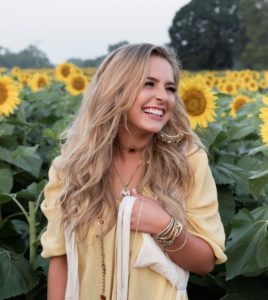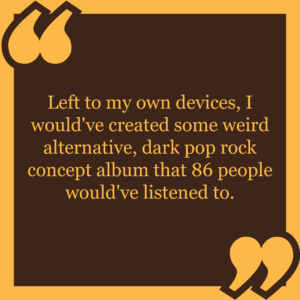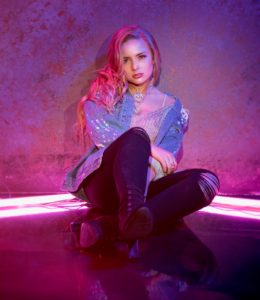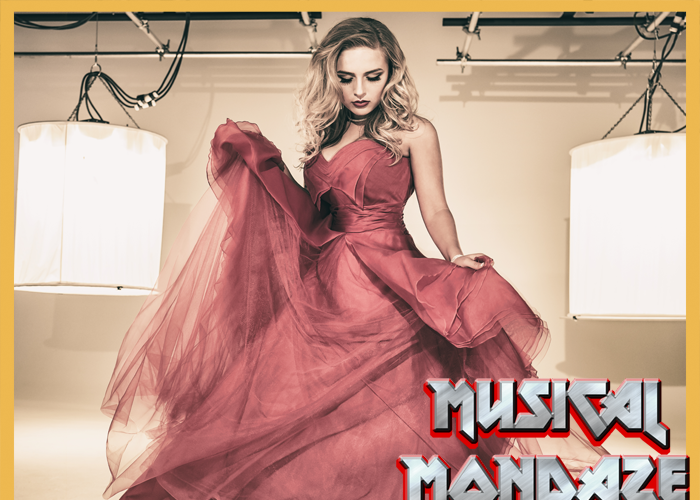 Mackenzie Nicole’s debut album “The Edge” is representative of who she is as an artist today, but she is determined to not let it define who she will become as an artist tomorrow. At only 18, the pop singer with the classically-trained voice and a wide array of musical influences (including The Doors!) anticipates growing and adapting creatively as she does so in her own life, always focusing on the now, especially in the future.
Mackenzie Nicole’s debut album “The Edge” is representative of who she is as an artist today, but she is determined to not let it define who she will become as an artist tomorrow. At only 18, the pop singer with the classically-trained voice and a wide array of musical influences (including The Doors!) anticipates growing and adapting creatively as she does so in her own life, always focusing on the now, especially in the future.
“It was me actually experiencing something in real time,” she says of the love songs on her debut album. “If I continue to do that, I think you’re right, I think that it will continue to be a small glimpse into my life at the time, and that’s how I kind of like it.”
We recently sat down with Nicole to discuss how the ‘80s and ‘90s impacted her music, what she would produce if left to her own creative devices, and why she’s on a mission to break the pop mold.
TrunkSpace: You said that your album was reflective of what you were experience in real time when making it. That’s what makes music so powerful, isn’t it, that people can relate to the honesty of what you’re experiencing as an artist?
Nicole: Exactly. That’s something that I want to strive for more, is being more honest and being more myself on these tracks, because something that was really hard about this album that was a great learning experience, but that definitely affected the outcome of the album, was that it was co-written. That’s something that I definitely had never done before. I’m so used to writing everything myself, and that’s something I can’t wait to get back to, because it was such an interesting learning curve. I think it was valuable. I think it’s valuable to learn to work with others on every level as an artist, but I can’t wait to get back to being 100 percent, completely me and what I’m thinking and the way I would say it, which is something that’s really important to me.
TrunkSpace: That’s pretty rare in the pop world. And especially from your particular perspective where you play instruments and have voice training in operatic singing, that would be a different approach than most take with the genre.
Nicole: I think that’s accurate. Thank you so much for knowing that and acknowledging that, because I always joke that my goal is to Trojan horse some substance into pop music, because right now, I know that for me, something that always wowed me is that I longed for, growing up, the music of the ’80s and ’90s and the pop music of that time, because it spoke to me more. That’s not to discount everyone. There’s amazing pop music of every era, but what spoke to me more was the pop music of the past more so than what I grew up around. It was always my goal to bring back some of that earlier influence into pop, packaged like the way I am which is, I look like a very typical pop artist, but I want to bring something else that you haven’t heard in a while or maybe you’ve never heard before, and that’s one of my goals.
We have a lot of really amazing artists doing that right now. We have artists like Halsey. We have artists who are in this more dark pop vein, which is what Dua Lipa calls her music. I think that pop is taking a really cool turn, especially the more urban influenced it is with hip hop and rap music, because that’s a huge part of what I grew up on, obviously, being a part of Strange Music.
cool turn, especially the more urban influenced it is with hip hop and rap music, because that’s a huge part of what I grew up on, obviously, being a part of Strange Music.
TrunkSpace: You mentioned ’80s pop, and if you look at somebody like Cyndi Lauper, regardless of who wrote her songs or who was playing on them, they were clearly HER songs. They had her unique point of view, which seems to be a rarity these days.
Nicole: That’s what I want to get to. After co-writing an album, what I learned and something I developed an ear for, is developing an ear for when an artist has written the words they’re singing and when they haven’t. I can pretty well identify which parts of a song were co-written an artist wrote, and which parts weren’t. I think that’s something that, if I can do that, that means other artists can do that. That means they can do that with my album and they can do it with any other album. I want to get to a point where the album, or the project, or whatever it is – the song itself – is so entirely my message and what I’m going for and what I’m trying to say, that you can’t tell the difference between if I wrote it or if I did have a co-writer. I want to get that authenticity. I think we did a pretty good job on “The Edge,” but nothing is perfect and especially not your first try, so I really can’t wait to improve.
TrunkSpace: You mentioned having influences in pop, hip hop and rap, but in terms of your training, you were coming from a much different place. Did you have to relearn anything when you started your pop career?
Nicole: 100 percent. Yes! Nothing is harder than being an opera singer and deciding to do pop music, because nothing is more at odds than pop music and classical training, because you learn to do everything correct when you’re classically trained. You know the exact, accurate, perfect way to sing. Not to say that I’m perfect or that my voice is perfect, but I know the perfect technique because that’s how I was taught to sing, and that’s how anyone who is trained to sing opera or classical was taught to sing. You know how to do something. What you don’t know is how to break those rules in a way that’s experimental. That’s something I had to learn, because it was very hard for me to come out of my shell to be able to not sing everything proper, to not insist on having everything be correct. You have to learn the rules to break them is what I’ve said about it. I’m grateful for my training, but it definitely was something that got in my way the first several years of my career.
TrunkSpace: There’s something very mathematical about pop, in terms of the structure, which must be so different than singing classically?
Nicole: The way in which each one is technical is very different. Opera is technical in a way that is more fluid and more creative, but there is a formula to pop. It’s like a writing prompt. You are given the lines and you have to decide how you’re going to color them in. That’s something that was also hard to accept, because I like a weird concept album. Left to my own devices, I would’ve created some weird alternative, dark pop rock concept album that 86 people would’ve listened to. I know that unfortunately, that was not beneficial to the group at large, being my label and the division I’m starting on A Strange Main, so we had to go a little bit more pop on this record. Cast that wide net first. That’s fine. I’m fine with that. I’ll go ahead and do a pop album and I’ll try and grow my following through that, and then I’m going to come through later on with a more experimental work that will really blow the minds of hopefully, the people that are following me from that wider net that we cast with the pop album.
 TrunkSpace: As an artist, is there ever a fear that you’ll be pigeon holed into a particular sound?
TrunkSpace: As an artist, is there ever a fear that you’ll be pigeon holed into a particular sound?
Nicole: Absolutely. Do we really need another blonde haired, blue eyed pop artist? That’s honestly something that bothers me a lot, every day, is that ultimately, I look and can sound just like 20 other artists I can think of off the top of my head, and that’s just the ones that are out right now. “How do you distinguish yourself?” That’s always the question I have to ask myself. “What are we going to do to keep from being pigeon holed, and how do we make sure that doesn’t become us?” Really, nothing is more true than the statement that the industry doesn’t need another blonde haired, blue eyed pop artist that sings love songs.
Ultimately, my goal is to say, “Okay fine, if I can’t fit that mold, if I can’t be that pop artist because there’s already too many of them, then what am I going to do?” I’m going to have to be myself. I’m going to have to figure out how to make myself work.
TrunkSpace: There’s something to be said about growth as a human. You’re still so young. You’re growing. You’re going to learn different perspectives and ways of thinking about things within your own life that will then be reflected in your music.
Nicole: Thank you. I get very frustrated a lot of times, because I look at people like Stevie Nicks and I wonder why I’m not her yet, and then I realize that’s because I’m 18. I look at people like Jessie Reyez, who is a goddess, and I wonder, “Oh my God, how am I not her yet?” I realize she’s been doing this since she was my age and she’s 27. That’s why. It’s about time and experience. Have I had an interesting life experience so far being raised in a rap label, and then starting my music career when I was nine, starting my solo career when was 15? Yeah, I’ve had a lot of weird and interesting things happen, but that doesn’t mean it isn’t going to take time for me to learn how to bring that to my artistry.
“The Edge” is available now.


